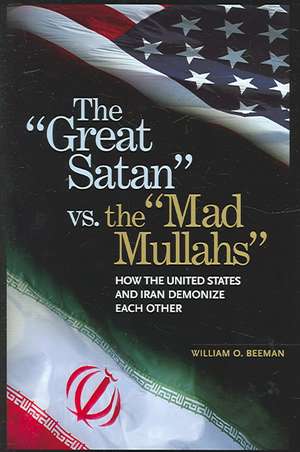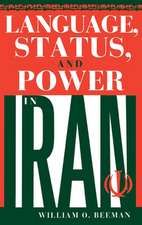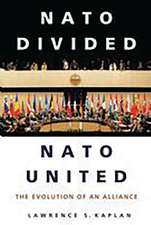The Great Satan vs. the Mad Mullahs: How the United States and Iran Demonize Each Other
Autor William O. Beemanen Limba Engleză Hardback – 29 sep 2005 – vârsta până la 17 ani
Preț: 358.75 lei
Preț vechi: 436.04 lei
-18% Nou
Puncte Express: 538
Preț estimativ în valută:
68.66€ • 70.92$ • 57.14£
68.66€ • 70.92$ • 57.14£
Carte tipărită la comandă
Livrare economică 25 martie-08 aprilie
Preluare comenzi: 021 569.72.76
Specificații
ISBN-13: 9780275982140
ISBN-10: 0275982149
Pagini: 316
Dimensiuni: 156 x 235 x 28 mm
Greutate: 0.65 kg
Editura: Bloomsbury Publishing
Colecția Praeger
Locul publicării:New York, United States
ISBN-10: 0275982149
Pagini: 316
Dimensiuni: 156 x 235 x 28 mm
Greutate: 0.65 kg
Editura: Bloomsbury Publishing
Colecția Praeger
Locul publicării:New York, United States
Notă biografică
William O. Beeman is Professor of Anthropology and Director of Middle East Studies at Brown University. He has lived and conducted research for over 30 years in all areas of the Middle East. He has served as a consultant to the U.S. State Department and the Department of Defense, and has testified before Congress on Middle Eastern affairs. He is the President-Elect of the Middle East Section of the American Anthropological Association (2005-2006) and will serve as President from autumn 2006 until 2008, then as Outgoing President from 2008 to 2009.
Cuprins
Introduction: Discourse and DemonizationAmerican MythsMiddle Eastern MythsDiscourse and RhetoricImages of the Great SatanImages of the Mad MullahThe Framework of U.S. Iranian RelationsThe Sins of the United StatesThe Sins of IranThe Birth of Post-modern Conflict: How Iranian Media Came of AgeLiving with Iran: Resistance as Post-modern Discourse
Recenzii
Regardless of the reader's viewpoint, this book is a challenging analysis by an anthropologist of an international conflict that threatens to get out of control. For that reason alone, this is a timely book.
[B]eeman is a good writer, who eschews the scholarly jargon that frequently makes academic books and articles unintelligble to all but specialists in a specific field. He is writing for the non-specialist, and he is more interested in informing the reader than in impressing his peers. The other strength of the book lies in the author's knowledge of Iranian history and culture. Beeman's discussion of economic development under the Pahlavi monarchy and how Americans in the country lived at the time is imformative, and his observation that Iranians hate being told what to do by people with whom they have no relationship should be taken under advisement by everybody..The Great Satan vs. the Mad Mullahs raises many questions and is problematic, those are additional reasons for reading it. It challenges the reader and forces him to question stereotypes about Iran and Washington's perspective on the country. It also encourages the reader to consider Tehran's perceptions.
[B]eeman is a good writer, who eschews the scholarly jargon that frequently makes academic books and articles unintelligble to all but specialists in a specific field. He is writing for the non-specialist, and he is more interested in informing the reader than in impressing his peers. The other strength of the book lies in the author's knowledge of Iranian history and culture. Beeman's discussion of economic development under the Pahlavi monarchy and how Americans in the country lived at the time is imformative, and his observation that Iranians hate being told what to do by people with whom they have no relationship should be taken under advisement by everybody..The Great Satan vs. the Mad Mullahs raises many questions and is problematic, those are additional reasons for reading it. It challenges the reader and forces him to question stereotypes about Iran and Washington's perspective on the country. It also encourages the reader to consider Tehran's perceptions.

















